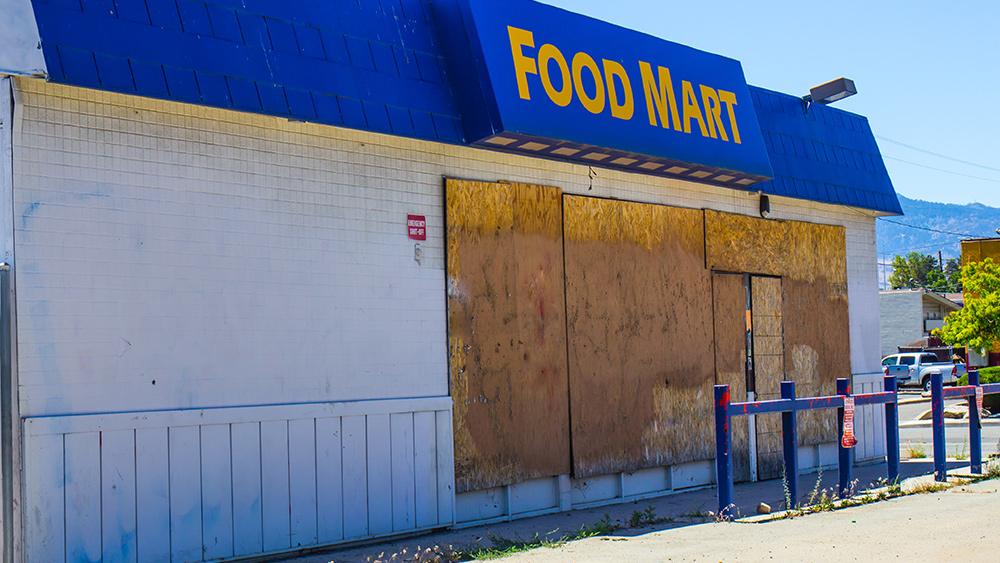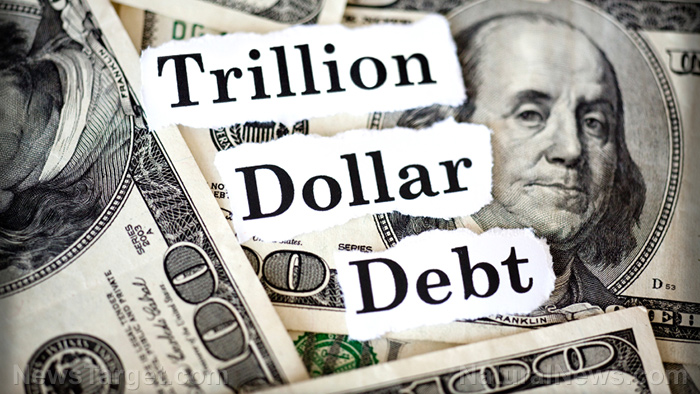BIG SHORT 2.0 – Investors holding top-rated debt backed by commercial real estate suffer LOSSES for the first time since 2008 financial crisis
06/04/2024 / By Ethan Huff

For the first time since the 2008 financial crisis, investors who hold top-rated debt backed by commercial real estate (CRE) are suffering losses as the economy continues its downward spiral into oblivion.
The Federal Reserve’s ongoing interest rate hikes coupled with plummeting office tower values nationwide have created a situation in which there is really no safe haven in the conventional markets.
Debt backed by CRE is a derivative instrument that comes with considerable risk, especially in the lower tiers. The fact that the highest tier, AAA, is also heading downward generating just 74 cents on the dollar shows just how bad things are getting.
“Now that we’ve seen the first commercial mortgage-backed securities get hit, other AAA bonds are bound to see losses,” warns Lea Overby, a CMBS strategist at Barclays. “These losses may be a sign that the commercial real estate market is starting to hit rock bottom.”
(Related: The collapse of CRE will bring with it a wave of bank failures.)
The everything bubble will eventually pop
For years, financial experts have been warning that the bubble known as the financial system is going to collapse. Some people call it the everything bubble because, well, it includes and affects everything.
With so much money leveraged in high-risk derivatives, and all of it sitting on the backs of banks, one falling domino will eventually topple all the rest of the dominoes, which is what we are now starting to see happen.
“When you take the hot air out that inflated the balloon, the balloon has to deflate and fall out of the sky,” writes David Haggith of The Daily Doom.
“Bubbles never stay inflation when you suck the cheap money back out of them. Part of that, I’ve warned, would include a huge real-estate implosion in mortgage-backed securities again, except that this time it would happen first and foremost in commercial real-estate, rather than housing.”
Like a volcano that is continually building pressure, the Fed’s interest rate hikes are killing what remains of the CRE market. Think empty strip malls and office buildings coupled with ever-worsening bank losses due to upside-down loans. The system can only take so much of this before it collapses.
“With about $700 billion of non-agency CMBS (commercial mortgage-backed securities) outstanding and another $3 trillion of commercial mortgages on bank balance sheets, even a modest uptick in losses could weigh on the financial system for years,” Bloomberg reported.
“To be clear, no one is predicting a repeat of 2008, when bad mortgages, mostly residential, nearly brought down the financial system.”
The latest Federal Open Market Committee (FOMC) minutes indicate much the same in describing a “deterioration in conditions in domestic CRE markets or a sharp tightening in financial conditions.” Is it really going to just blow over like Bloomberg seems to be suggesting?
“A little tip like that from the Fed, which sounds almost sanguine, can have volumes hidden behind it,” Haggith writes. “That is how the Great Recession came about. First nothing, then one bank, then a second, then many all over the place.”
Haggith predicted that 2024 would be the year when top-tier CRE bonds started to see losses. Next comes a much larger debt explosion, especially after it becomes clear that all these promises about rate cuts are empty and not going to happen anytime soon.
Housing prices also continue to rise despite very few actual Americans being able to afford them. Unless you already own a house, your chances of ever being a homeowner are getting slimmer and slimmer the longer this trainwreck takes to materialize.
The global financial system is built on a house of cards. Learn more at Collapse.news.
Sources for this article include:
Submit a correction >>
Tagged Under:
2008, Bubble, chaos, Collapse, commercial real estate, CRE, debt bomb, debt collapse, economic riot, economy, finance, finance riot, financial crisis, inflation, investors, losses, market crash, money supply, panic, pensions, risk
This article may contain statements that reflect the opinion of the author
RECENT NEWS & ARTICLES
COPYRIGHT © 2018 MONEYSUPPLY.NEWS
All content posted on this site is protected under Free Speech. MoneySupply.news is not responsible for content written by contributing authors. The information on this site is provided for educational and entertainment purposes only. It is not intended as a substitute for professional advice of any kind. MoneySupply.news assumes no responsibility for the use or misuse of this material. All trademarks, registered trademarks and service marks mentioned on this site are the property of their respective owners.




















